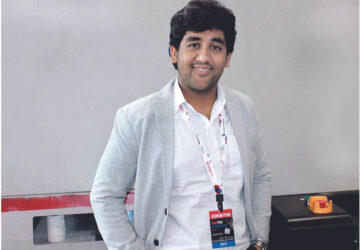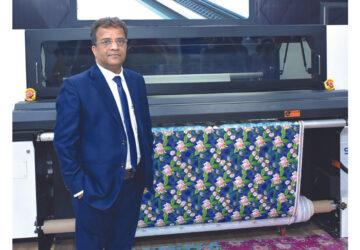The Lenzing Group announced that it has successfully pioneered a new technology platform, LENZING™ Web Technology, with a focus on sustainable nonwoven products that will open up new market opportunities for the industry. Following an investment of 26 mn euro and several years of research and development, Lenzing completed the commissioning phase for a one-meter wide pilot facility located at their headquarters in Lenzing, Austria.
Currently, most of the nonwoven products are made with plastic materials like polyester or polypropylene, which take hundreds of years to decompose. Coupled with inadequate disposal techniques, the nonwoven industry is a leading contributor to landfill issues globally. With the LENZING™ Web Technology, absorbent nonwoven fabrics with botanic origin will be manufactured using environmentally responsible production process. The nonwoven fabrics produced in 15gsm to 80gsm basis weights with a wide range of surface textures and drapeability properties will also be certified biodegradable, clean and safe.
“While the nonwoven segment currently represents 30 per cent of our core business, we are committed to driving stronger growth through more active involvement in innovations across the value chain. LENZING™ Web Technology is a key milestone that embodies our focus on specialty products under our corporate strategy sCore TEN. We will continue to lead the innovation of sustainable speciality products and empower industry partners and customers with more sustainable offerings to drive business success,” said Stefan Doboczky, Chief Executive Officer and Chairman of the Management Board of the Lenzing Group.
The new LENZING™ Web Technology is a nonwoven web formation process that starts with botanic wood pulp and produces a nonwoven fabric made of 100 per cent continuous Lyocell filament. This web can be integrated with standard non-thermal based nonwoven bonding technologies, such as hydroentangling and needle punching. In addition, the patented technology enables a unique self-bonding mechanism where filaments bond into a fabric during the laydown process. This self-bonding mechanism enables a product range with a much wider variety of surface textures, drapeability and dimensional stability than other nonwoven technologies utilizing 100 per cent cellulosic fibres.
“The LENZING™ Web Technology is a perfect example of Lenzing’s strategic growth and its commitment to developing new break through innovations, by providing more sustainable products to consumers. We will continue our quest to address consumers’ changing awareness about single-use products, and proactively take part in our customers’ journey to success through technology innovation and sustainable cellulosic products,” said Robert van de Kerkhof, Chief Commercial Officer of Lenzing AG.
LENZING™ Web Technology will serve as a platform technology for a wide range of future products for the nonwoven industry. The flexibility of the technology and the possible integration with other nonwoven and textile technologies will enable the development of a wide range of composite structures for highly engineered end use applications.
“Given the nonwoven fabric market size is expected to reach close to $35 bn in 2022, with a staggering compound annual growth rate of 7.5 per cent per year over that period, it is crucial to support eco-responsible development of the nonwoven industry by using sustainable raw materials. Consumers have become more aware of the negative impact of plastics in waterways and marine ecosystems. It is therefore incumbent upon the disposable products industry to step up and address such concerns. We envision that our new LENZING™ Web Technology will enable the value chain to create more innovative applications out of natural, biodegradable cellulose materials,” said Wolfgang Plasser, Vice President of Global Business Management Nonwovens at Lenzing.
As a pioneer technology for cellulose nonwoven fabrics, scalable availability of nonwoven products enabled by the LENZING ™Web Technology will be available following further technology development and ongoing enhancement of processes and products together with industry partners.



















